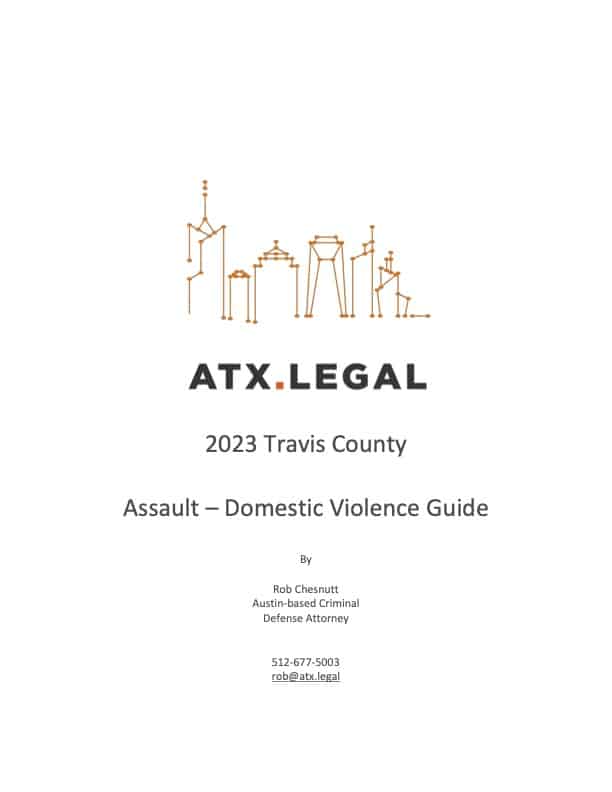FVIP Program and Pretrial Diversion
The Family Violence Intervention Program (FVIP) for misdemeanors, and Pretrial Diversion for Felonies each allow the case to be dismissed following completion of certain requirements. This is often great for the client because he/she does not have to admit guilt and the case can be expunged from their criminal history. Not all cases will qualify for these programs. They are offered at the discretion of the prosecutor, and you must apply and be accepted.
CONTACT ATX LEGAL
FVIP
The FVIP program lasts 6-12 months and can sometimes be ended earlier if all requirements are completed early. Once complete, the case is dismissed, and can be eligible for an expunction. Importantly, the FVIP program does NOT require an admission of guilt. After dismissal (and sometimes after a waiting period) the case can be expunged from your criminal history.
Of course, there are some requirements that you must adhere to during the course of the program. If you violate these requirements, you can be kicked out of the program and the prosecution will be restarted.
During the 6-12 months, you will usually need to complete BIPP (Batterer’s Intervention and Prevention Program) classes. These classes can be from 16 to 52 weeks. Obviously if the BIPP classes are on the longer side, they can extend the time you are on FVIP. You will still be on bond and the case is pending during this time and won’t be released until the classes are done. If there are bond conditions, you will still have to comply with those. Of course, is there is a Stay-Away order, you will need to comply.
The biggest requirement is that you do not pick up any new charges. Any new criminal charge above a class C violation (traffic tickets are allowed) is going to get you removed from FVIP. This is especially true if the new charge is a domestic violence case. If that occurs, you will now be facing both criminal charges and the case becomes exponentially more difficult. It is very important not to put yourself in a position to pick up a new charge while on the program.
The FVIP program replaced the former “Deferred Prosecution”. If you are familiar with the deferred prosecution, the key difference between it and the FVIP program is that with the deferred prosecution, the case would be dismissed up front. This was preferred for many reasons. On your criminal history, the case would show as dismissed. Even though you would need to wait until the Deferred Prosecution expired before getting it expunged, many employers will accept a dismissal as a resolution for the case. Unfortunately, the Deferred Prosecution is totally within the discretion of the prosecutor, and it is no longer offered in Travis County.
It’s not all bad though. Unlike the Deferred Prosecution, with the FVIP program, you do NOT need to admit guilt. Even though that admission would typically never leave the prosecutor’s office, it can still be a huge factor in immigration cases and other edge cases. An admission of guilt in a family violence case can be the difference in attaining citizenship or even being deported. Also, it could mean an automatic conviction in cases where the client failed out of the FVIP program. Now, the prosecutor simply reactivates the case and we can begin negotiations again.
Pretrial Diversion (Felony Cases)
The FVIP program is only for misdemeanors. So what happens if you’re in felony court? Felonies are handled in District Court, and there you may qualify for pretrial diversion. It lasts for 12 months, also requires BIPP classes, but additionally includes monthly check-ins and probation fees (approximately $65 per month).
Just like FVIP, the case can be dismissed and expunged once complete. You also must avoid new charges, especially new charges involving violence. It’s a little more onerous because of the monthly check-ins and fees. The prosecutor can also tailor the program and add new requirements. The additional requirements beyond FVIP reflect the fact that the felony is a more serious charge with more significant consequences.
Conclusion
In conclusion, either of these programs are typically great options because they can dispose of the case while keeping your criminal history clear. It can also be a quicker and less stressful resolution than setting the case for trial. In cases where FVIP or Pretrial Diversion is not being offered, I will often fight to get my client reconsidered. To avoid a conviction and a family violence finding while also avoiding trial is a big deal. That’s why these programs have a full section in this guide. They are often my client’s best option for these cases get resolved.
Download the free PDF Guide by clicking the image below:

